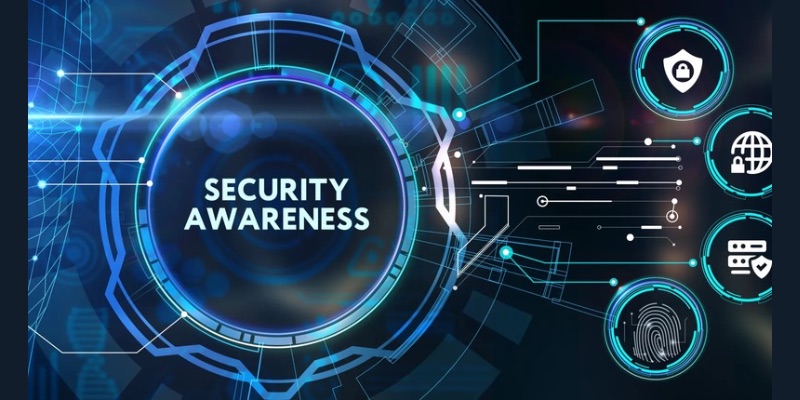Top Security Awareness Training Companies in 2025
April 12, 2025, 21 min read
Yes, yes — we are all witnessing the rise of AI, automation, and those overly confident chatbots that somehow always mess up your pizza order. It might feel like the robots are taking over, but let me stop you right there — we’re not quite in full Jarvis territory just yet.
See, even in this shiny new era, the knowledge and cleverness of our human coworkers are still one of the best weapons we’ve got against all the cyber goblins trying to sneak in through the digital backdoor. You, me, Brenda from accounting, even that new intern who still thinks VPN stands for “Very Personal Notebook” — we’re all part of the defense squad whether we like it or not.
And with great power… well, you know how the saying goes. Except in this case, it’s not about radioactive spiders. It’s about making sure that everyone on the team actually knows what they’re doing when a suspicious link lands in their inbox or when Gary from “tech support” asks for login credentials.
That’s where security awareness training comes in — and where this blog has your back.
We’re going to break it all down:
- What security awareness training companies actually do
- The types that exist out there
- Why they’re more important than ever
- The top companies in 2025 that are worth your attention
- And how to choose the right one without pulling your hair out
Now that I succeeded in squeezing two Marvel references here already, let’s get into it — starting with a little clarity: what exactly is a security awareness training company, anyway?
What Does a Security Awareness Training Company Mean?
Let me break it down for you.
A security awareness training company is exactly what it sounds like — a team that helps your team get smart about cybersecurity. They’re not selling you antivirus software or setting up your firewalls. Instead, they’re focused on the people part of the equation. Because let’s be honest, even the best tech can’t stop someone from clicking a sketchy link that says “Free iPhone.”
These companies create programs that teach your employees how to recognize threats, avoid risky behavior, and respond smartly when something seems off. Think phishing simulations, bite-sized training modules, real-world scenarios — all designed to make security part of everyday thinking, not just some annual compliance checkbox.
In short: they help turn your biggest vulnerability (humans) into your strongest defense.
What Types of Security Awareness Training Companies Are There?
Here’s the thing — there’s a lot to teach when it comes to cybersecurity. It’s not just about telling people “don’t click sketchy links” and calling it a day. From phishing to password hygiene to handling suspicious USBs (yes, those are still a thing), there’s a whole curriculum out there.
And because of that, not every company covers everything — nor should we expect them to. Some go broad, some go deep, and some pick one area and absolutely own it. So, what kinds of training companies are out there? Let’s break it down:
- Simulation-focused pros – These companies are all about realistic experiences. Think phishing email simulations, fake phone scams, even staged social engineering tests that show your team just how sneaky real threats can get.
- Testing & tracking champs – These ones build tools to measure what your team actually knows. They offer quizzes, knowledge checks, and progress tracking — because if you can’t measure it, how do you know it’s working?
- Localized content creators – Cybersecurity doesn’t speak just one language. These companies offer training in multiple languages, often with localized cultural context so it doesn’t feel like a direct translation of a training manual from 2004.
- Plug-and-play content platforms – Think of these as Netflix for cybersecurity training. You get a ready-to-roll library of videos, modules, and templates that you can start using immediately, no setup headaches required.
- Analytics & insights nerds (in the best way) – These teams don’t just train, they give you the numbers: engagement rates, behavioral shifts, threat recognition improvements. Basically, they help you prove that what you’re doing is actually making a difference.
Some companies stick to one of these buckets. Some cover all five and then some. The key is knowing what your team needs — and who’s best equipped to give it to them.
Now that we know the players, let’s talk about why they matter in the first place.
Why Do We Need Them?
Because even the most locked-down security system still has one unpredictable variable: people.
Here’s the uncomfortable truth — most breaches don’t happen because some genius hacker cracked your system with elite code. They happen because someone got tricked into handing over the keys. Maybe it was a convincing vendor email that looked just real enough. Or a calendar invite that led to a credential-stealing site. Or someone panicked and responded to a fake “CEO request” without thinking twice.
Security awareness training companies exist because we need to prepare for the human side of risk, not just the technical one. And the truth is, without structured, ongoing training:
- Employees don’t know how to verify a suspicious request.
- They won’t recognize that one link in the Slack message as a spoof.
- They may reuse weak passwords across personal and work accounts — making your whole system fragile without realizing it.
Training programs turn vague fear into practical muscle memory. So when something sketchy hits the inbox, the first instinct isn’t to panic — it’s to pause, assess, and respond smartly. That kind of thinking doesn’t happen naturally. It’s taught.
And that’s exactly why these companies are not a “nice-to-have.” They’re a necessity.
Next up? The good stuff: let’s talk benefits.
What Are the Benefits?
You know how drinking water, getting sleep, and stretching before a workout aren’t exactly flashy, but they absolutelymake everything else work better? That’s what good security awareness training is like. It’s foundational. And the benefits go way beyond “people know what phishing is now.”
Let’s get specific:
- It reduces actual incidents — Not in theory. In reality. Companies that regularly train their staff see fewer successful attacks. When your team knows how to spot red flags, those shady emails don’t get far.
- It saves serious money — A well-timed “hey, does this look right to you?” can save your company from wire fraud, ransomware, or weeks of PR damage control.
- It sharpens your response muscle — Trained teams react faster. They report suspicious activity, escalate the right things, and don’t freeze when something goes wrong.
- It builds a security-first culture — When everyone speaks the same security language, from interns to execs, you’re not just safer — you’re stronger.
- It helps you sleep at night — Knowing your team isn’t one click away from disaster? That’s worth its weight in gold.
And here’s the kicker: all of this is scalable. You’re not just protecting one person — you’re upgrading the entire team. One click smarter, one click safer.
Top Security Awareness Training Companies in 2025
Folks, time to get the pen and paper ready and buckle up!
- Free training available? No
- Pricing details: Custom pricing depending on company size and needs
Hoxhunt leans heavily into gamified learning — think of it as leveling up your team’s cybersecurity reflexes one mission at a time. Their platform is all about engagement. It personalizes training based on the user’s behavior and adapts to how much of a security newbie (or not) they are. It also offers real-time phishing simulations and continuous reinforcement, so employees don’t claim they learned — they actually improve.
What makes Hoxhunt stand out is how addictive it can be — in a good way. Employees literally get excited to “hunt phish.” It feels more like a game than training, which is perfect if your team zones out during traditional presentations. If your goal is to turn your people into alert, responsive security players without boring them to tears, this is one to look at.
- Free training available? No
- Pricing details: On the higher end; enterprise-level pricing
SANS doesn’t mess around. It’s one of the most trusted names in the cybersecurity space, and their training platform reflects that. They offer a deep catalog of content covering everything from basic phishing awareness to secure coding practices and executive-level risk management. The materials are high-quality, well-researched, and built by real experts who know what they’re doing.
This one is for the serious folks — organizations that don’t just want “some training,” but want the kind of program that compliance teams and CISOs drool over. It’s ideal for larger enterprises or anyone who has to meet strict regulatory standards. If your org lives in industries like finance, healthcare, or government, SANS brings the heavyweight tools.
- Free training available? Partially — some free phishing tests available
- Pricing details: Affordable plans for SMBs; full pricing on request
VIPRE focuses on helping smaller and mid-sized businesses up their security game without needing a full-on security team. Their platform is easy to use, quick to deploy, and covers key essentials like phishing simulations, interactive lessons, and regular updates to reflect current threats. It’s great for companies that need a solid solution without a learning curve.
What makes VIPRE interesting is how accessible it is. It’s a bit like getting the deluxe security package without the enterprise bloat. And they know their audience — a lot of their training focuses on real-world attacks, not abstract theory. It’s clear, straightforward, and designed for folks who just need to know what not to click without reading a 40-page manual.
- Free training available? No
- Pricing details: Included with Mimecast Awareness Training plans; pricing is quote-based
Mimecast Engage isn’t just another training tool — it’s part of a bigger picture. Since Mimecast is already a powerhouse in email security, Engage plugs right into their platform to help reinforce awareness where it matters most: the inbox. It features bite-sized content, behavioral analytics, and personalized nudges to turn risky users into security champions over time.
What sets Mimecast apart is how seamlessly it integrates with actual email activity. They don’t just guess who’s risky — they know, and the training reflects that. It’s a smart choice for companies already knee-deep in Mimecast’s other offerings and looking for a more all-inclusive approach.
- Free training available? No
- Pricing details: Tiered pricing; custom quotes for orgs
NINJIO stands out from the jump by making security awareness feel like binge-worthy content. Think of it as cybersecurity meets Netflix, but with way more educational value. Every episode-style video is animated, story-driven, and built around real-world breaches — with new ones dropping regularly. The episodes are short (under 4 minutes) and laser-focused on grabbing attention.
NINJIO’s superpower is storytelling. They’ve found the sweet spot between entertaining and educational, which makes them great for companies struggling with engagement. It’s not just another talking-head webinar — it’s a weekly “Whoa, that could happen to me?” moment.
- Free training available? Yes – has a free version
- Pricing details: Free tier available; paid plans depend on feature access
Keepnet Labs goes broad and deep. This platform has all the essentials: phishing simulations, incident response, threat intelligence, awareness training — even an email threat simulator. Their dashboard centralizes everything, and the modular approach means companies can build exactly the stack they need.
What’s cool about Keepnet is its flexibility. It’s like a cybersecurity buffet — you pick what fits your current needs, and you’re not locked into a single plan. Oh, and if you’re the hands-on, data-loving type? Their reports and analytics won’t disappoint.
- Free training available? No
- Pricing details: Pricing based on number of users and modules
Terranova is all about customization. They offer content in over 40 languages, and the modules are modular (yes, that’s a thing) — so you can tailor everything from tone to topic. Whether you want phishing simulations, policy compliance, or role-based training, Terranova’s got a plug-and-play vibe that makes scaling feel smooth.
Their edge? Localization. Not just in language, but in cultural nuance. If your team spans continents, this isn’t a nice-to-have — it’s essential. Terranova makes sure your Mumbai team isn’t getting content that sounds like it was made for Minnesota.
- Free training available? Partially – offers a free trial
- Pricing details: Starts at $50/month; scalable with user count
PhishingBox is big on hands-on testing. It’s less “let’s sit and learn” and more “let’s see what happens if Dave clicks this suspicious link.” The platform specializes in phishing simulations, threat templates, and training follow-ups tailored to results. It’s lean, targeted, and gives you real control over campaign design.
What makes PhishingBox click (pun intended) is how much freedom it gives admins. You want to get crafty with your simulations? Go for it. You want to track who’s clicking and who’s coasting? It’s all there. It’s ideal for SMBs and IT pros who want granular control over everything.
- Free training available? No
- Pricing details: Pricing starts at $10/user/year; scalable for larger teams
KnowBe4 is a giant in the security awareness space, and for good reason. It offers an all-in-one solution that includes phishing simulations, security training, and even a robust risk management platform. Their training library is vast, with over 1,000 pieces of content — from videos to interactive courses — which ensures they have something for every kind of learner.
What makes KnowBe4 stand out is the sheer volume of training content and the level of customization available. Plus, they’re known for their ability to measure and track user progress effectively, with detailed reporting that can help you spot trends and problem areas. If you’re looking for a comprehensive platform that covers all the bases, KnowBe4 is your go-to.
- Free training available? No
- Pricing details: Custom pricing based on enterprise needs
Proofpoint is a big player in the cybersecurity space, and its security awareness training offering is no different. Their platform combines phishing simulations, risk assessments, and personalized training modules. They’re also big on providing content in multiple languages, which is a huge bonus for global teams. Plus, their reporting suite is top-notch.
Proofpoint is particularly strong when it comes to integrating with other enterprise security tools. If you’re already using Proofpoint for email security or threat detection, their security awareness training meshes seamlessly with those tools. It’s a great option if you’re looking to consolidate your cybersecurity stack and keep everything under one roof.
- Free training available? Yes – a free trial available
- Pricing details: Starts at $2.39/user/month
Infosec IQ is a highly customizable training platform that offers a wide range of security courses, phishing simulations, and assessments. Their easy-to-navigate dashboard allows admins to monitor results and tweak training modules as needed.
The thing that sets Infosec IQ apart is the focus on personalized, role-based training. You can tailor the content to specific job functions, making sure the lessons are relevant and directly applicable to each user. This targeted approach helps improve engagement and retention.
- Free training available? No
- Pricing details: Custom pricing based on user numbers and features
OutThink is a great choice for organizations that want to go beyond traditional, static training. Their platform is highly interactive, using real-world scenarios and gamified elements to teach security awareness. OutThink’s training covers everything from phishing to password hygiene and even data protection, all in a way that feels engaging and memorable.
What makes OutThink stand out is its focus on behavioral change. It’s not about just completing a module — it’s about instilling long-term habits that will reduce risk over time. Their AI-driven approach tailors content to user behavior and integrates feedback loops to ensure that learners are engaged and improving.
- Free training available? No
- Pricing details: Custom pricing based on user count and features
Cofense PhishMe is all about fighting phishing where it counts — in your users’ inboxes. The platform provides real-time phishing simulations, training content, and attack response workflows to help employees learn to spot malicious emails before they cause any damage. Cofense also focuses on continuous training to keep your users on their toes.
What sets Cofense apart is its focus on proactive detection and response. They don’t just wait for users to make mistakes — they continuously test and re-test your team’s ability to spot phishing emails. This keeps employees alert and ready for the next attack, making it a solid choice for organizations that want to stay one step ahead of cybercriminals.
- Free training available? Yes – offers free courses for individuals
- Pricing details: Starts at $99/year for individual plans
Cybrary is a well-known platform in the cybersecurity education space, providing a broad range of learning materials across various security topics. The platform offers both free and premium content, with courses tailored to beginners, as well as more advanced users. They also feature certifications and industry-specific training paths to help individuals and teams upskill.
What sets Cybrary apart is its community-driven approach. With active forums, peer support, and expert-led learning, Cybrary makes it easy to learn and engage with others in the field. It’s a perfect option for those looking to upskill in a more dynamic, collaborative environment, where you can constantly test your knowledge and gain real-world insights.
- Free training available? No
- Pricing details: Custom pricing based on the number of users and features
SMARTFENSE specializes in security awareness training that’s designed to be flexible and scalable for businesses of all sizes. Their platform includes customizable phishing simulations, security assessments, and interactive training content to help organizations create a culture of security. It also includes real-time monitoring and reporting tools to track user performance.
The thing that makes SMARTFENSE unique is their focus on user engagement. Instead of traditional training methods, they incorporate interactive scenarios and real-world attacks to teach users how to spot threats in a more relatable, hands-on way. This makes it easier to retain information and apply it effectively in everyday situations.
- Free training available? No
- Pricing details: Custom pricing based on company needs
Guardey offers a robust security awareness training platform designed for businesses seeking to improve their overall security posture. They provide a mix of on-demand training modules, phishing simulations, and policy management tools. Guardey also includes a strong reporting suite that helps businesses track and measure the success of their awareness campaigns.
What makes Guardey interesting is its ability to deliver a personalized experience for users. They tailor training to the specific needs of an organization, ensuring that the content is relevant and impactful. Guardey’s emphasis on metrics and real-time feedback allows businesses to adapt quickly and refine their training as needed.
- Free training available? No
- Pricing details: Starts at $3/user/month
Hook Security focuses on building engaging and human-centered security awareness training. The platform offers a variety of modules covering phishing, social engineering, and other cybersecurity topics.
Their training is designed to be both educational and fun, using humor and storytelling to make the learning experience more memorable which is what makes them different. This method has been shown to increase user engagement and retention, ensuring that employees not only remember the training but are more likely to apply it in real-world scenarios.
- Free training available? No
- Pricing details: Custom pricing based on user count and business needs
ESET provides comprehensive security awareness training that integrates seamlessly with its security software products. It includes phishing simulations, training modules, and cybersecurity assessments, all aimed at helping employees recognize threats and improve their security hygiene. Their training is designed for all skill levels and is available in multiple languages.
ESET stands out for its seamless integration with its cybersecurity suite, offering a unified solution that combines endpoint protection with training and awareness. For businesses already using ESET’s security products, adding their awareness training creates a cohesive defense against cyber threats, streamlining both prevention and education efforts.
- Free training available? No
- Pricing details: Custom pricing based on the number of users
Phinsec offers a focused approach to phishing and social engineering awareness training. The platform specializes in realistic phishing simulations, combined with tailored educational content to help employees identify and mitigate phishing attacks. It also provides ongoing training to reinforce lessons and keep users on their toes.
What makes Phinsec unique is its commitment to providing highly realistic phishing simulations. They offer a wide variety of phishing scenarios that reflect the latest threat trends, which keeps employees engaged and ready for the next attack. Their customized training approach ensures that the learning experience is directly relevant to the threats organizations are facing.
- Free training available? Yes – Free demo available
- Pricing details: Starts at $2.25/user/month
Usecure’s platform combines automated training with continuous awareness reinforcement to improve overall organizational security. They provide phishing simulations, social engineering training, and policy management tools.
Their approach also includes gamification elements, making security training feel less like a chore and more like an engaging experience. By integrating gamification and real-time feedback, they ensure that employees stay motivated throughout the entire training process. This helps create long-term, positive behavior change and a culture of security.
- Free training available? No
- Pricing details: Starts at $5/user/month
Breach Secure Now offers a comprehensive security awareness program with an emphasis on real-world phishing simulations and personalized training content. Their platform also includes in-depth reporting tools and a user-friendly interface for admins to manage and monitor training progress. It is designed to help businesses reduce the risk of human error and improve overall security posture.
What sets Breach Secure Now apart is its high level of customization. It allows businesses to tailor training content based on the specific needs and security threats of their organization. This customization ensures that employees are better equipped to handle the specific risks they face on a daily basis.
- Free training available? No
- Pricing details: Custom pricing based on user count and needs
Phished.io offers an intuitive security awareness training platform with a focus on realistic phishing simulations and automated training. Their platform includes modules that cover a wide range of topics from password hygiene to recognizing phishing emails and social engineering tactics. They also offer a robust reporting system to track user progress.
What makes Phished.io interesting is its AI-driven phishing simulations that continuously adapt to user behavior. By customizing the difficulty of phishing attacks based on how users respond, Phished.io ensures that employees are constantly challenged and engaged, making the training experience more effective.
- Free training available? No
- Pricing details: Custom pricing based on company size and features
Awaretrain provides security awareness training with a focus on user engagement and practical learning. The platform offers phishing simulations, policy management, and a wide range of training materials that are designed to educate employees about common cybersecurity threats. They also provide detailed analytics to measure the effectiveness of training programs.
What sets Awaretrain apart is its emphasis on user-centric training. They focus on delivering a learning experience that resonates with employees, making the content relatable and practical. Their easy-to-use platform allows businesses to get started quickly while providing all the tools necessary for tracking and improving security awareness over time.
- Free training available? No
- Pricing details: Custom pricing based on user needs and company size
Webroot offers an integrated security awareness training platform that includes phishing simulations, security education, and policy enforcement. Their platform is easy to use and is built to scale with businesses of all sizes. Webroot is particularly known for its endpoint protection products, which can be paired with the training modules for a more complete security solution.
What makes Webroot unique is its combination of security training and endpoint protection. Their platform is well-suited for businesses already using Webroot’s other cybersecurity products, as it provides a seamless, unified approach to security. The integration of both training and endpoint protection makes it a strong choice for organizations that want an all-in-one security solution.
- Free training available? No
- Pricing details: Custom pricing based on user count and business needs
CybeReady is a specialized security awareness training platform that focuses on creating personalized learning paths for employees based on their behavior and security risk profile. It includes phishing simulations, security training modules, and detailed reporting tools to help businesses track and improve their security awareness programs.
What sets CybeReady apart is its focus on personalization. The platform adapts the training experience to individual users, ensuring that each employee receives content that is relevant to their specific role and security behaviors. This targeted approach maximizes engagement and retention.
- Free training available? No
- Pricing details: Custom pricing based on user count and features
Cofense Inc. (formerly PhishMe) is known for its advanced phishing simulation platform, which is designed to help businesses recognize and respond to phishing attacks. It combines real-time phishing simulations with training and incident response capabilities, helping to create a more comprehensive approach to human risk management.
What makes Cofense Inc. unique is its focus on threat intelligence and real-time phishing response. The platform not only helps employees recognize phishing attempts but also trains them on how to respond if they fall victim to an attack. This proactive approach is crucial in building a culture of security awareness and reducing the likelihood of successful cyberattacks.
- Free training available? No
- Pricing details: Custom pricing based on company size and features
SoSafe is a user-centric security awareness platform that offers personalized training programs for employees, combining phishing simulations with interactive modules on various cybersecurity topics. Their platform also includes detailed reporting tools, allowing businesses to track progress and measure the effectiveness of their training programs.
What makes SoSafe interesting is its focus on creating a tailored training experience for every employee. By adapting the content to the specific needs and behavior of users, SoSafe ensures that the training is more engaging and relevant, making it easier for employees to retain key information.
Which Criteria Should You Keep in Mind When Choosing?
Alright, you’ve made it through the list. Maybe even bookmarked a few names. Congrats, we are proud of you. But before you dive headfirst into a contract — or get dazzled by someone’s ultra-slick interface — let’s talk about how to actually choose the right one for your team.
Because here’s the deal: the “best” training platform isn’t universal. It’s the one that fits your team’s size, industry, threat landscape, learning style — and yes, budget.
Here’s what to keep in mind:
- Content fit – Does it actually teach what your team needs to know? A healthcare org has different risks than a retail chain. Make sure the content speaks your language — and your threats.
- Training format – Do your people prefer interactive modules, videos, or quick quizzes? A platform that feels like a chore won’t stick. Go for one that aligns with how your team naturally learns.
- Customization & culture match – Can you tailor the messaging to fit your brand and voice? Does it feel like something your team will connect with, or is it giving stiff, “2005 corporate compliance” energy?
- Reporting and analytics – If you can’t measure what’s working (and what’s not), it’s just noise. Look for platforms that give you clarity, not chaos.
- Languages and localization – Especially if your team is global. Subtitles alone won’t cut it for some folks. Native-language support makes a real difference in how much people actually absorb.
- The price factor – Let’s be real. Some teams have budget to burn, others are scraping together change from under the coffee machine.
If you’re a startup or a tiny team just getting your bearings, don’t be afraid to go for free or super affordable options — they’re often way better than you think. But if you’re handling sensitive data, dealing with compliance-heavy sectors, or need advanced features like simulated phishing, that’s when investing in a more robust (and yeah, pricier) solution makes sense.
Bottom line? Don’t pick based on who’s trending on LinkedIn — pick based on who’ll actually make your team safer.
Final Words
Let’s be honest: this stuff matters more than most people like to admit. We’ve reached a point where ignoring security awareness just isis just plain stupid — if you care about keeping your data (and your sanity) intact.
And no, you don’t need to turn your workplace into a cybersecurity bootcamp. But helping your team understand the basics — and reminding them regularly — goes a long way. Whether you pick a big-name platform, a no-frills solution, or even start off with free resources, what counts is that you start somewhere.
Think of it like locking your front door. It’s not dramatic. It’s just smart.
That’s the whole point of this blog: to help you figure out what’s out there, what works for your needs, and how to make decisions that aren’t just checkbox-deep.
Alright. You’ve got this. But before you go, let’s answer some of those questions you might still be wondering about…
Frequently Asked Questions
1. Do I really need security awareness training for my small team?
Yes. Size doesn’t protect you. Attackers don’t care if you’ve got 5 or 500 employees — they just want in. One bad click is all it takes. Even basic training can make a real difference.
2. Can’t I just send everyone a PDF or a video and call it a day?
You can, but that’s like tossing someone a cookbook and expecting them to make a perfect soufflé. Good training is interactive, ongoing, and actually sticks. One-and-done doesn’t cut it.
3. What’s the ideal frequency for training?
Start with something regular — monthly or quarterly. Think of it like brushing your teeth. You don’t just do it once and hope for the best.
4. How do I know if the training is working?
Look for platforms that offer analytics and testing — like phishing simulations or quizzes. But also just… talk to your team. If they start spotting shady emails before IT does, you’re on the right track.
5. Is there such a thing as free security awareness training?
Yup, and it’s a solid starting point if you’re tight on budget. Some platforms offer limited free versions or community resources. Just make sure whatever you pick still feels current, engaging, and easy to understand.




























